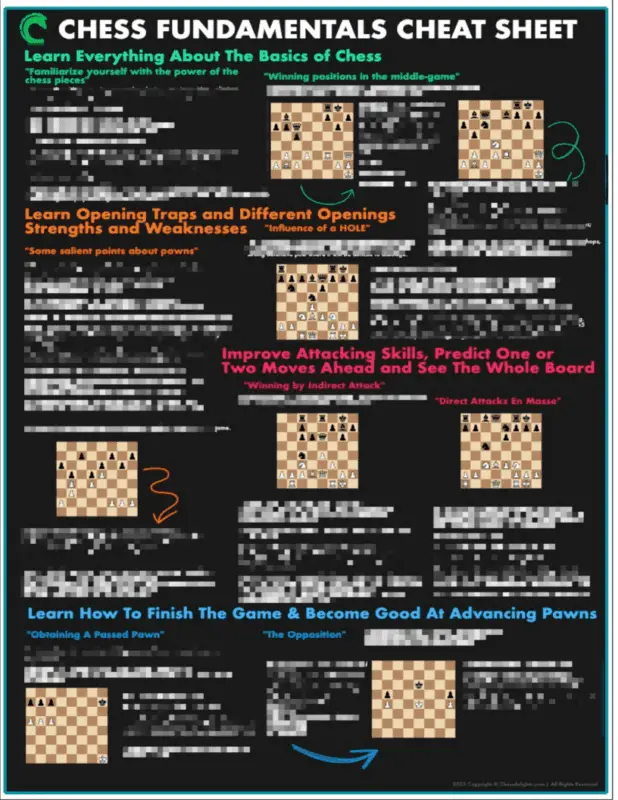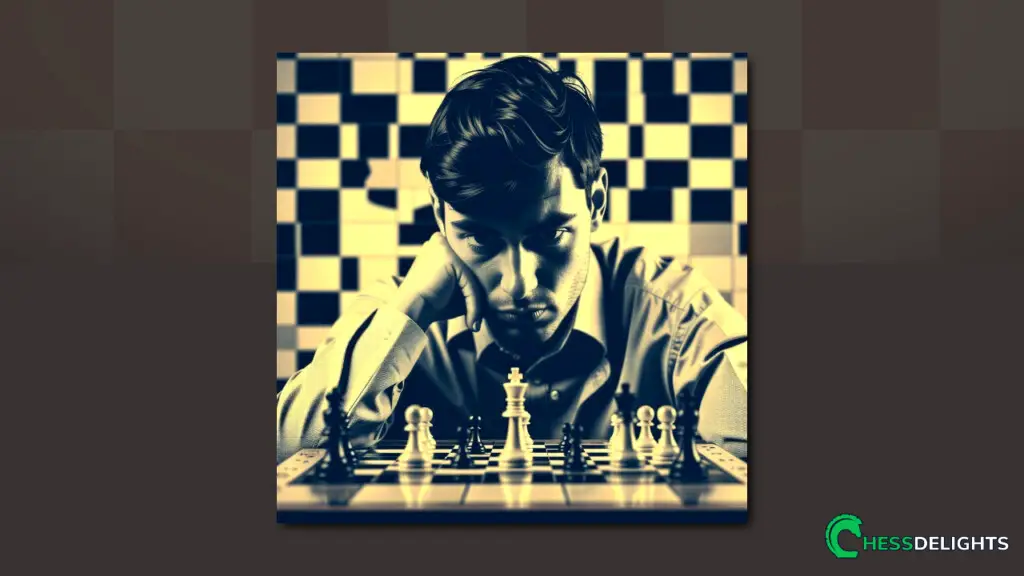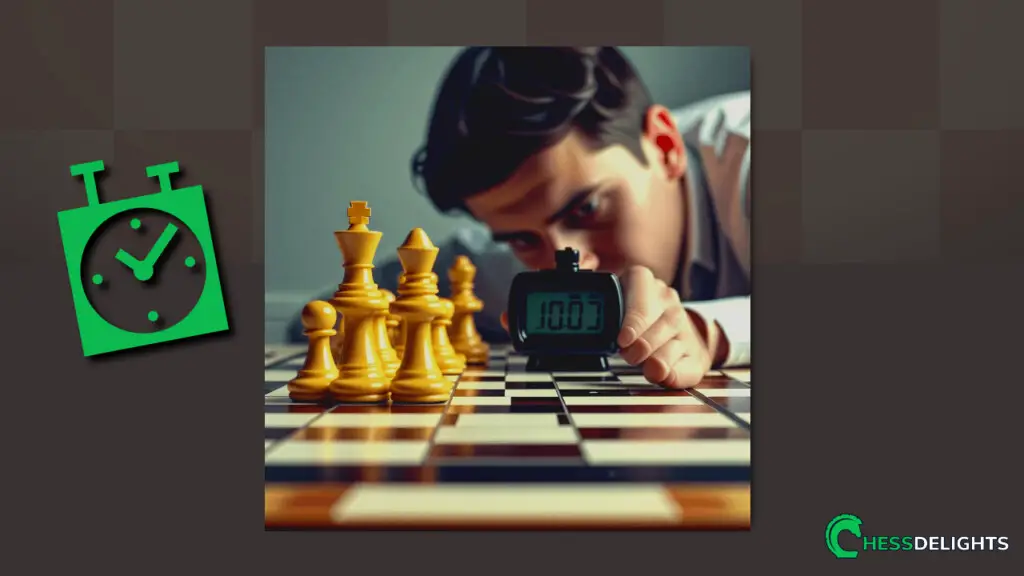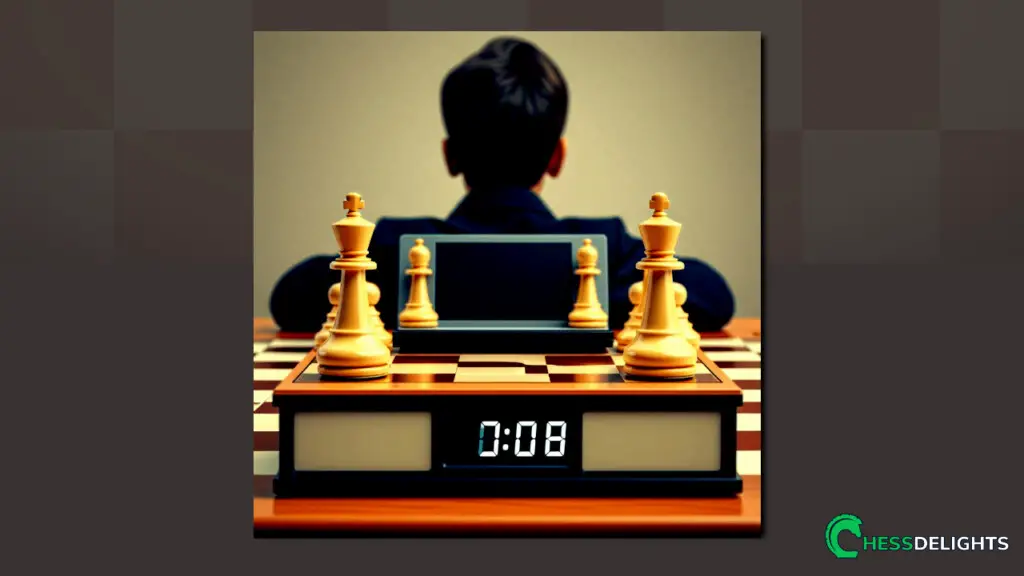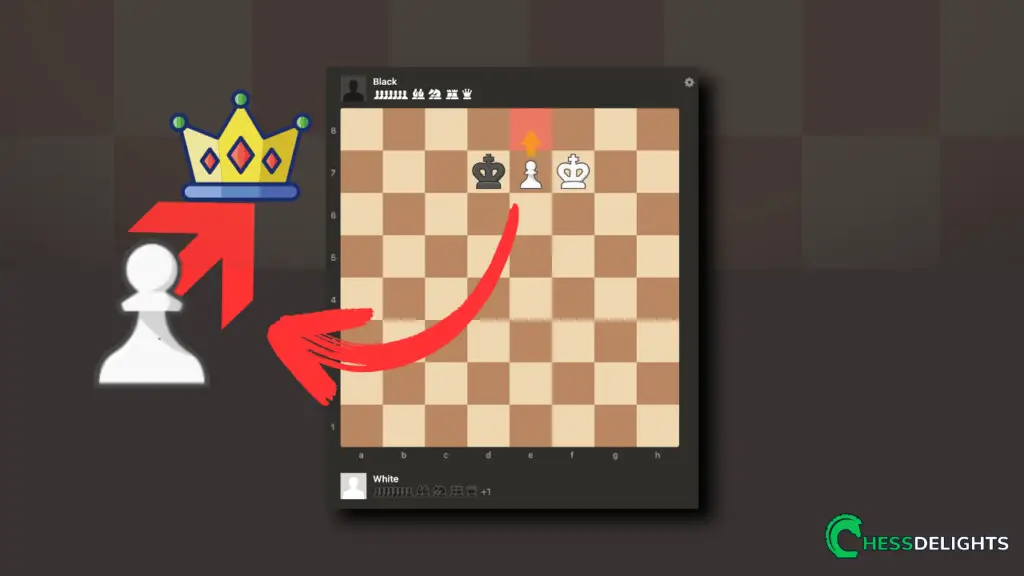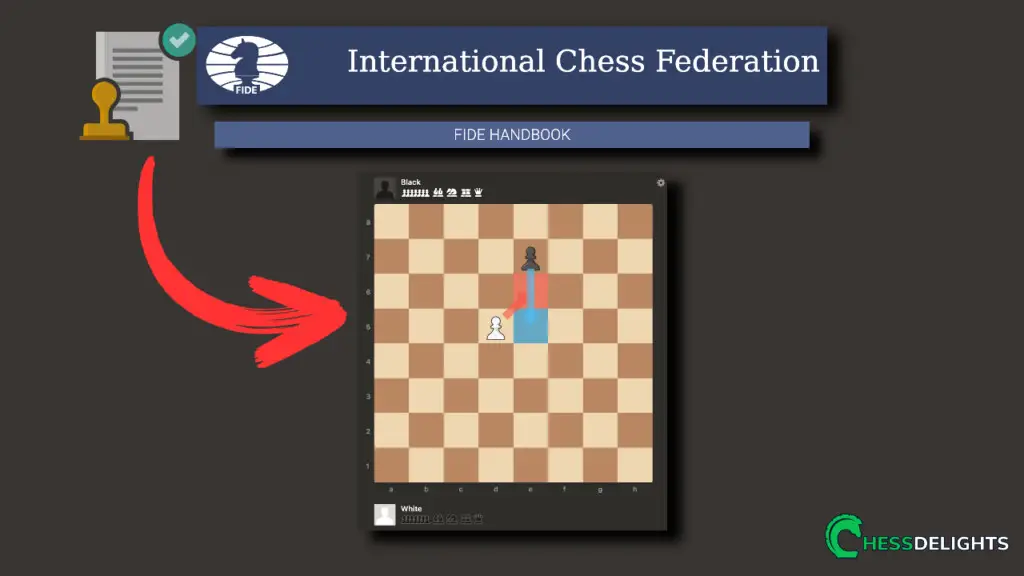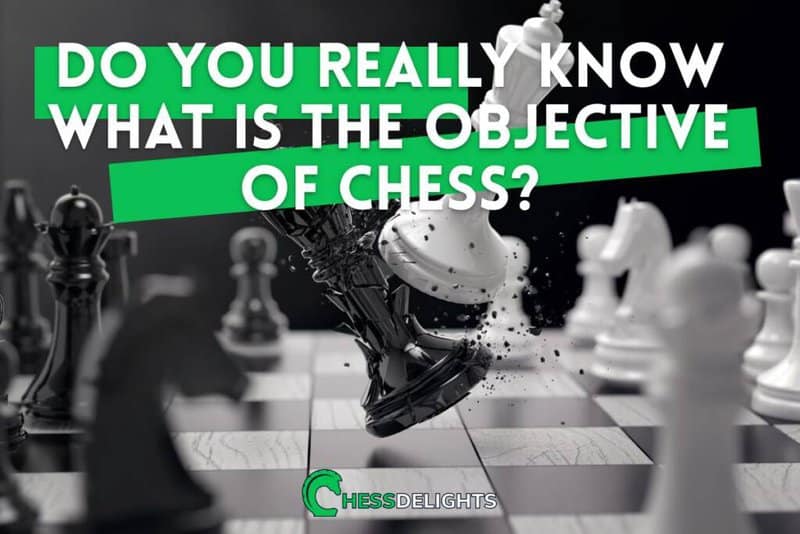Are you confused if you can play chess alone? I mean can a single person play chess alone? Well, the answer is yes, of course…You can play chess to improve and analyze your game; I think that this is one of the best practices in getting good at chess.
Just like Bobby Fischer, who plays chess alone, chess learning can be non-stop, play chess as long as you want. Be good at playing chess, and you can become one of the greatest chess players.
I genuinely believe that this game can be learned and can be mastered at any stage of your life. Starting young can be the most effective way but do not stop learning and playing chess with other chess players.
Also, do not think that you can only play chess if you have a real opponent with you. You can play chess alone; in this article, I have written 21 effective ways on how to play chess alone.
Table of Contents
1. Use the right chess set
Why use the correct chess set? What I mean is you cannot use a chess set that is flimsy or a chess set that can easily fall.
Use the right chess set, chess pieces should have some weight on it, and the chessboard should have the right square size, and chess pieces can be placed on the squares correctly.
The reason is you don't want to play chess alone and just get frustrated with the poor quality of your chess set. This is the time you need to concentrate or practice your skills alone; you don't want the chess set to become a problem.
That is why to effectively play chess alone to use or buy the right chess set.
Recommended Reading: If you want to learn if you can undo a move in chess, read this article.
2. Play chess comfortably
You have to be comfortable when playing chess. Having a real chess opponent can make you feel uncomfortable; it's the same with playing chess alone…
Most especially if you are playing chess alone because you have to compete with yourself, that is why you have to feel comfortable… How? You have to be comfortable with your clothes, the chair you are seating or the shoes or sandals you are wearing (anything that can make you feel uncomfortable).
These things I mentioned should not get in the way in your alone time playing chess. You will experience a more productive chess game when you are not distracted by those things.
Remember to play chess alone only if you feel comfortable.
3. Find the best place at home
Let's be clear; playing chess alone should not be played like a rapid game.
This type of chess practice can or should be played in the best place you can find at your own home. You may at some point leave the chess game on a table, and you might continue playing alone tomorrow or on another day.
That is why I mentioned that you have to have a good chess set, and you need to find the best place in your home. You can look for the best place in your home to play chess like a corner or a place where it is suitable for playing chess.
A place where you are comfortable, and you feel that you can play chess alone effectively.
4. Play chess puzzles
Now, if you are not interested in playing alone like a full chess game from the start… Then you can play chess alone with chess puzzles; this can enhance your strategy and tactic skills.
Playing chess puzzles is still playing chess alone, but the only difference with playing a full chess game by yourself is that the chess puzzles have a predetermined answer or solution.
You need to find a solution and finish the game. The best thing you can do is to deviate from the solution and play a typical chess game against yourself.
If you want a chess game against yourself from the start, then continue below.
5. Setup white chess pieces first
To effectively play chess alone, you have to start setting up the chess board first. Since you already have a good chess set, you feel comfortable, and you found an excellent place to play chess…
Then set up the chess board with white chess pieces first, this will simulate a chess game with a real opponent. Pick up all the white chess pieces and adequately place the chess pieces on the chess board. After doing that, then you can flip the board or move to the other side and set up the black chess pieces.
The same thing this will simulate like you have a real opponent. If you don't know how to set up a chess board yet…
Here is some image of a chess board setup, follow the patterns, and you are ready.
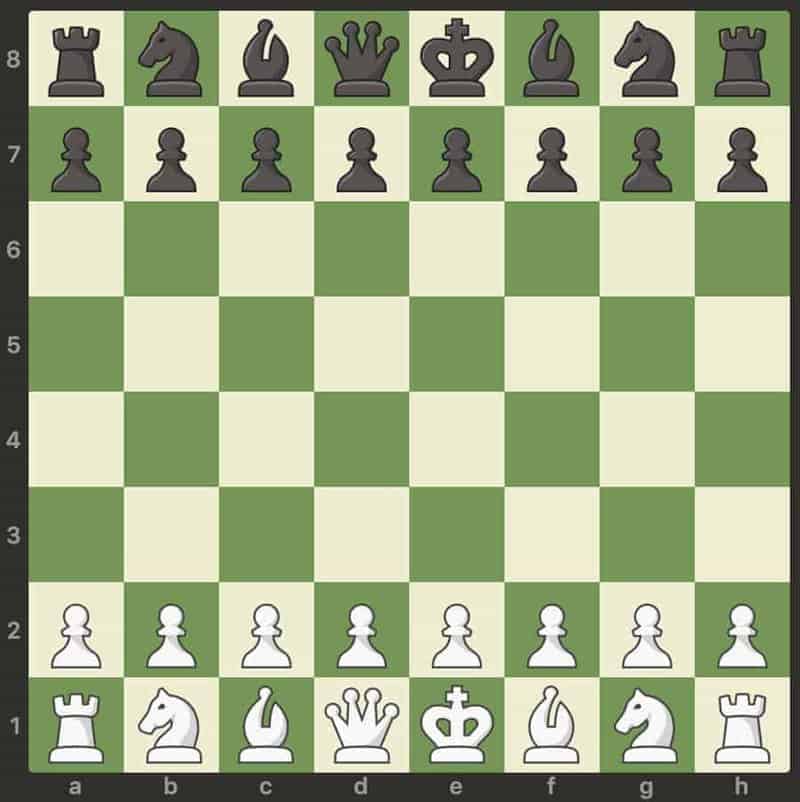
6. Give enough time with every chess move
There are some chess players or newer chess players who play chess alone but doesn't seem to know the purpose of playing chess alone.
They most of the time, try to rush their game like playing a rapid game… You need to give enough time each turn when playing alone; you can perform and benefit well in playing chess alone without rushing.
So, instead of taking turns moving the chess pieces while sitting on one side… what you can do is try to stand up and go to the other side of the table and play as if you are looking at your opponent.
Standing up and doing some stretches will give some time to have fresh eyes on the board instead of quick moves which will not help improve your chess game at all.
7. Avoid copying moves
Another problem when playing chess alone is that we do not sometimes notice that we are copying our moves. It is like mirroring your moves…this sometimes is not an effective way to play chess alone.
You will, at one point in the game be stuck, and you feel like you are not getting any new ideas or strategies when you keep on copying the chess moves that you usually move daily.
This can happen most often when you rush the chess moves, so what you need to do is to give enough time each turn by trying to stand up or even try to make a move the following day.
Just don't try to rush because it will be more likely to happen that you will be mirroring or copying your chess moves.
8. Play with chess notation
Since you are going to start playing chess alone… And you would probably follow the other guides above like giving time each turn or even making a move the following day.
Then you need to write down the chess moves to be able to track your game. If you are a beginner, this will help you familiarize yourself with writing chess notations and will be more productive with playing chess alone.
What I suggest is that even if you do not postpone your chess games the following day, you still need to write down the chess moves. This will give you a necessary break on each turn, making a chess move and then writing down that move.
Play chess with chess notation; this is important if you want to play chess against yourself to be more productive.
9. Use a marker
Another effective way of playing chess alone is that you need to have a form or simple method to recall or remember who's turn is it to move.
This method can be an alternative for writing chess notation, not the most effective when it comes to being able to analyze the games…
But, effective in remembering who is going to move next after a few hours or even the whole day of not playing. You can use any marker like a coin, cap of the bottle or a colored paper…whatever it is that you can use to recall the next one to move.
I've seen recommendations like a cap of bottle to be placed in front of the chess board for the one who is going to make the next move.
Leave the marker there and make sure that you can visibly see it once you get back on the game.
10. Play and think regular chess match
As much as possible, you should not be biased when you are playing chess alone. The problem with this is you already have the feeling that white will win or black should win on this match. You need to think of a regular chess match, play as if you are playing with a real chess opponent.
Do not try to play like the game has already been won, and you have selected the winner in your mind. When you think regular chess match you would feel the same excitement or nervous feelings when playing serious chess games.
If you do not play and think of a regular chess match when playing alone, then it won't be as effective as you want it to be.
Again, the best way probably is to give the right amount of time on every move you make.
11. Focus and plan your chess moves
Playing chess alone is not easy at all… Grandmasters play chess alone, and they take it seriously, you need to focus and plan every move you make. You can discover a lot about yourself and your strategy when you focus and plan accordingly.
Some chess experts say that they were able to identify their strengths and weaknesses while playing alone with as much focus and planning.
If you are playing chess alone and you don't have any intentions to focus on the game and make plans properly to compete with your ideas, then you would probably waste an hour of your day.
Well, if focus and planning is your problem or weakness, then playing chess alone can still help you overcome that problem.
Because you need to focus and make plans to defeat yourself, you may need a lot of practice time to gain focus and chess planning if you are having a problem with those at the initial stage.
12. Play the strategy or tactics you just learned
If you are going to try to play chess alone and you don't know the right approach in playing against yourself…
Then you can start by grabbing a chess book and reading some of the famous chess plays or even try to go online and search for some chess moves that you can study or learn. Or… You can go online again and then search for chess strategy or tactics, learn a quick strategy or tactics, and give some time to practice it by yourself first without playing against yourself.
After getting the idea about the strategy or tactics, then you can play chess against yourself using that strategy or tactics.
This will help you identify your strengths and weaknesses, and it is like playing against the tactics you just learned or playing with the strategy that you have learned against your strategy and tactics.
If you want to make it simple, especially if you are just a beginner, you can follow the strategy or tactics that you have just learned and give it your best to make the best counter moves.
That way, you can familiarize yourself with that strategy or tactics while playing with your chess knowledge.
13. Play with your best openings
When I was a kid learning chess, I was mostly interested in learning the openings. I used to memorize the opening moves, and from then on, I try to play my tactics and strategies.
So, when playing chess alone, it's always best to start with playing some chess openings that you are interested in master, and you feel that you need to learn.
The advantage of playing with your best openings when you are alone is that you can also see hidden weakness or you can explore that opening even more. To be more effective with this is that you should play the best opening from both sides, you play your best opening with white, and then you play with the best opening for black.
You will be more likely to become a stronger player with those openings the next time you play with a real opponent.
14. Do not favor one side while playing chess alone
When you start playing alone, especially when you are a newer chess player. You begin to favor one side to win the game.
This will not benefit you at all, and you should follow the above guide where you need to play regular chess match. When you do favor one side to win, then you will tend to take back moves — you sort of chosen who would win already.
Instead of just going through the whole process of the game and helping yourself to improve your own game. You need to keep the right balance of the game; you are not playing alone to fool yourself.
If you are doing this and you favor one side, then you have a different purpose in mind, and it would not be worth it playing chess alone with that mindset.
15. Compare moves with the Chess Grand Master
Another effective way of playing chess alone is that you compare moves with a famous chess game.
It is like taking your notes and comparing it to the standard when you do that you can analyze every move the chess grandmaster has made and you will somehow be able to get an idea why the move was like that.
How do you exactly benefit from comparing moves the grand master's move? Well, when you have a chess move that you have taken from a famous game, you would try to compare your plan with the master's plan.
After going through the entire game playing chess against yourself, then you would go to the master's chess game and see what the master has moved.
You would assume or consider that move to be the best move if your move has to lead you to a blunder, a move with no strategy or tactics, or worse is that move caused you the whole game.
This way of playing chess alone will be more beneficial and effective for you, especially if you are just new in chess.
16. Play alone with a chess clock
Why would I play with a chess clock? You may think that this will go against the other guide that I have mentioned above… Well, it does not, you do need to play alone with a chess clock to be familiar with using a chess clock, to help you get used to the feeling of playing in a time constraint chess game.
You might say, “yes, I understand but having a chess clock will force me to play a bit faster.” That is true but not necessary; you have to set the chess clock with a longer time.
You can also pause the chess clock if your chess clock has that feature available. You don't need to cheat the timer, go through the whole process. The purpose is to find out where you are lacking; you might have no idea how to play with a chess clock if you are just new with chess.
So, having the option to pause your chess clock can be valuable for you.
Note: When you do pause playing chess alone, you chess notation or marker will help you identify who's turn is it to make a move.
17. Play chess alone to win
To play chess alone effectively, you need to set your mind to win the game. No matter what chess color you are playing with, you have to play chess against yourself to try to checkmate your opponent and win the game every single time.
You would want to bring out the best in you and try to win the game, especially if you are trying to play chess against yourself. This is the best practice you can give yourself by trying to give it all you can to win.
The most rewarding part of thinking to win the game against yourself is you will come out with a lot of new ideas and when you do play a normal game with a real chess opponent, thinking of winning all chess game will become second nature to you.
Note: You should keep this in mind throughout your chess learning. Thinking of winning is better than thinking about how good your opponent is and how nervous you are.
Even for Grand Master, I supposed, when they are thinking that they are not going to win and their opponent is far better than themselves, then they will lose the chess match.
18. Make a note after playing chess alone
After every game or alone time playing chess, you should give yourself a moment to write down notes on the actual chess game.
What mistake did you identify? What move made you that mistake? What counter move you should have taken to avoid that? When you can answer that after playing chess alone, then that is one effective way of playing chess alone. Because you can quickly go through the notes every time you play a game, and you try to avoid and improve on your game.
More aspects of your game will be enhanced when you do make a note after playing chess alone.
To benefit from the note that you have made during your chess play alone, you need to browse them at least as often as you want. So you can recall what are the mistakes or new strategies you can implement or avoid when you play a new chess game with a real opponent.
19. Do not play when frustrated
Some people use chess to play alone and try to release their frustration… I suggest you do not play when you are frustrated, not only does it affect your real game but it can also make you hate chess game as well.
When you do have kids, and you are teaching them chess, and you encourage them to play chess alone. You should tell them not to play chess when they are having a bad mood or frustrated.
The same thing with playing chess with a real opponent, but this happens with playing chess alone too.
Remember that you want to improve your game and want to have better results on your next chess match that is why you want to use this alone time playing chess as a way to become better and not to get frustrated.
20. Start playing chess alone early
For those people who love playing chess and have work or a job… You should start playing chess alone early in the morning (otherwise play during your off day), maybe an hour before going to work and assuming that you have set up the best place to play chess alone.
Place where the chess board is secure, and you can come back anytime, and it's still intact, just like what I mentioned above.
Because if you are going to start playing chess early then you can leave it there, make your best move with no intention to rush the game.
Playing chess alone should not be rushed at all, it strategic and playing chess early means you have a fully rested, and you are ready to play the best chess move.
21. Set an alone chess play schedule
Playing chess alone can be very useful for improving your chess game… Especially… If you set a playing time or chess play schedule for your chess playing time alone.
Ideally, you should be playing when you have free time. If you're like me, I tend to play chess for a very long time, and I do not notice the time anymore…
And what happens is that I miss doing some essential activities. So, if you can set a schedule for an alone chess play time without affecting any important activities, then that would be perfect. That means you can focus, you are comfortable, and there is no distraction.
That will be the most effective way of playing chess against yourself. Schedule it and have fun.
Wrapping Up
I hope I was able to encourage you to explore playing chess alone and learn some of the effective ways of playing chess alone…
There are a few guides above that applies both for playing chess alone and playing with a real opponent. And the important thing you need to know is that you can improve your chess game while playing chess alone.
It's not always that you need to play chess with a real opponent, because sometimes you play better moves than your opponent. When you counter yourself with better moves, then you identify your weakness and strength along the way.
So, yes, you can play chess alone, and you can follow some of the effective ways of playing chess alone from the above guide.
Recommended reading: If you want to learn about the best way to learn chess ,read this article.
